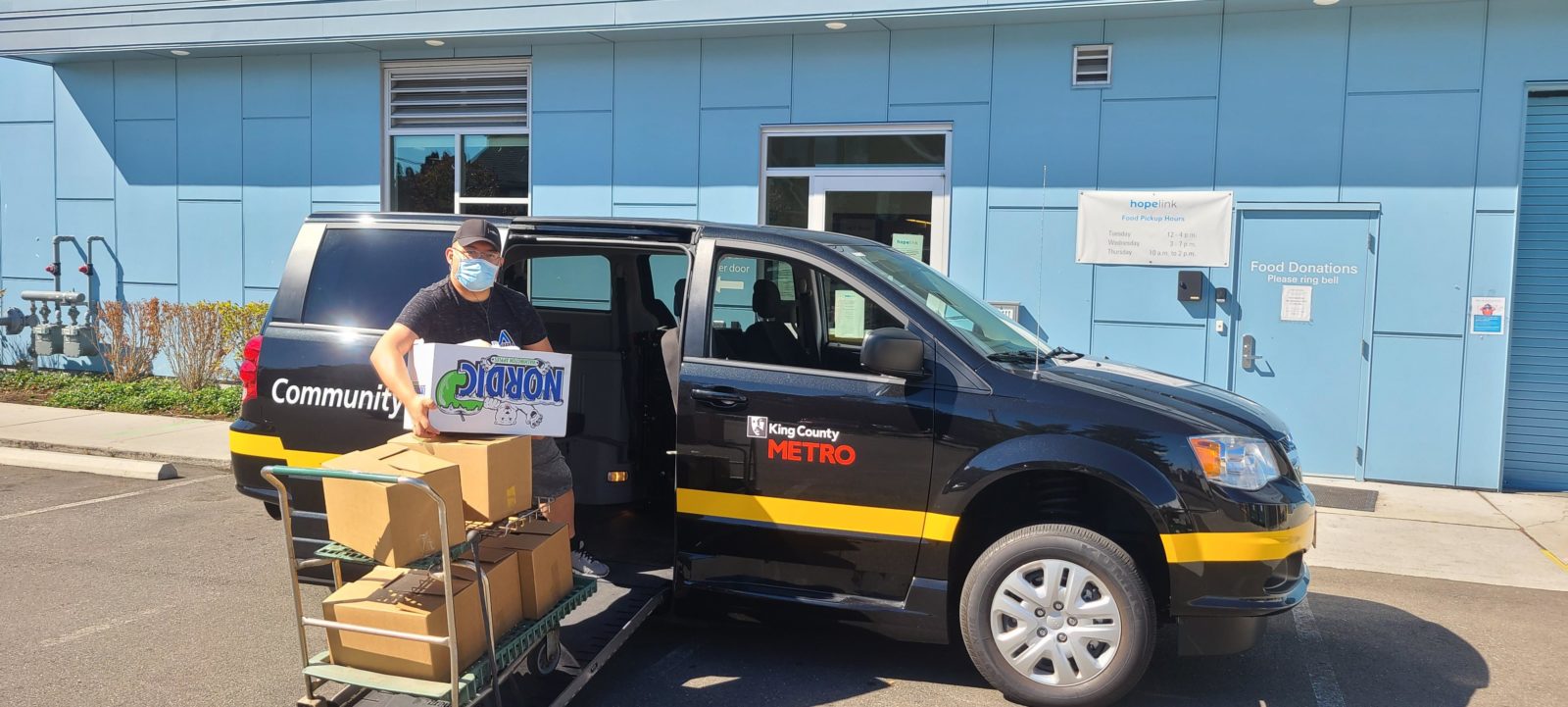Providers Team Up to Provide More Than a Meal

Early in the COVID-19 pandemic, it become clear that congregate meal programs would be profoundly impacted. In many cases, programs hosted by senior centers and community-based agencies had to shut down. Some moved to a curbside pick-up model, while many older adults sheltering in place needed meals to be delivered.
Congregate meal programs funded through the Older Americans Act offer “more than a meal.” The congregate dining experience promotes social connectivity and connects older adults to other health and wellness programs and social services. Home-delivered meals provided by Meals on Wheels and Chicken Soup Brigade serve older adults who are homebound but during a pandemic, when “homebound” suddenly includes everyone, the number of older adults who needed food to be delivered increased greatly.

Access driver Therese Ramminger picks up hot meals at Asian Counseling and Referral Service for delivery to older clients quarantined at home. Photo by Gino Larsen-Giacalone.
After a short initial period of uncertainty, agency staff and volunteers sprang into action. G De Castro, Director of Aging and Adult Services at ACRS, offered a play-by-play of how things developed in the early days of COVID: “Staff reached out to community agencies and organizations as they pursued a delivery model. The response was overwhelming. Volunteers reached out to help pick up both groceries and meals from the ACRS location on MLK Way and deliver to the Asian Pacific Islander community members in need. Meanwhile, the number of seniors needing meals and food supplies at home steadily increased. ACRS reached out to Access Transportation for support.”
Access Transportation is the King County Metro ADA paratransit program, which provides transportation for people with disabilities. Federal waivers and an emergency declaration allowed Access and community transportation providers to offer delivery support. In March, Metro gave the go-ahead for MV Transportation and Solid Ground—contracted Access service providers—to shift to delivery of food and meals.
“This partnership has been crucial in maintaining the essential food programs that ACRS provides to seniors in our community,” concluded De Castro. Throughout the summer, ACRS and other agencies continued to rely on Access for delivery support.

Need food? Click on the graphic above to open the Seattle Human Services Department’s interactive Emergency Food Resource Map and find a program near you.
Other transportation providers also responded quickly to the new reality. For example, Sound Generations’ Hyde Shuttle program transitioned from passenger transportation to meal delivery and now delivers 8,400 meals per month to 10 meal sites throughout King County. Providers’ quick reaction during an unprecedented emergency demonstrated an ongoing commitment to meeting the needs of older adults. Collaboration across the older adult services and transportation sectors is enabled and supported by groups such as the Regional Alliance of Resilient and Equitable Transportation, a regional planning and mobility management coalition that connects community transportation to emergency management.
King County Metro recently announced that they will continue providing food delivery support through the end of the calendar year. This came as a relief to food and meal providers and their clients who were concerned about support being cut off. As the pandemic continues, providers are continuing to innovate and develop other partnerships to sustain delivery support into 2021.
One successful approach involved a partnership between United Way of King County, DoorDash, 10 food bank partners, and several Safeway stores. “We expect the need for home delivery to continue to rise and are working hard to meet community needs with healthy and culturally appropriate food,” said United Way Associate Director Jenny Walden.
Creativity and care for community have been the hallmarks of pandemic response efforts. As summer turns to fall, Aging and Disability Services will continue to work with transportation and food providers to keep older people in King County well-fed, healthy, and connected.
Contributor Jon Morrison Winters is a senior planner at Aging and Disability Services, the Area Agency on Aging for Seattle-King County.
Photo at top features Paulo Medina, a Community Van volunteer driver, lending a helping hand to deliver food boxes from the Shoreline Hopelink food bank. Photo courtesy of Victor R. Londono Quintero, Hopelink Mobility Management.
This article originally appeared in the October 2020 issue of AgeWise King County.
![Aging & Disability Services for Seattle & King County [logo]](https://www.agingkingcounty.org/wp-content/themes/sads/images/seattle-ads-logo.png)